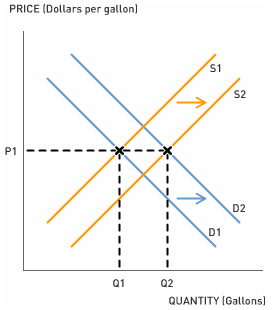Harvey's Milk
by Brandon Fuller On June 9, new rules governing organic dairy farming will take effect. The Harvey rule—so named for the Maine blueberry farmer whose lawsuit prompted the change—will increase the cost of converting a conventional dairy operation to an organic one. Under the old rules, obtaining the organic designation required nine months of feeding cows a blend of 80% organic and 20% conventional feed, followed by three months of 100% organic feed. The Harvey rule requires farmers to feed cows 100% organic feed for the entire conversion year. In essence, the new rule makes the conversion process "more" organic.
On June 9, new rules governing organic dairy farming will take effect. The Harvey rule—so named for the Maine blueberry farmer whose lawsuit prompted the change—will increase the cost of converting a conventional dairy operation to an organic one. Under the old rules, obtaining the organic designation required nine months of feeding cows a blend of 80% organic and 20% conventional feed, followed by three months of 100% organic feed. The Harvey rule requires farmers to feed cows 100% organic feed for the entire conversion year. In essence, the new rule makes the conversion process "more" organic.The expectation of a more expensive transition, combined with relatively high organic-milk prices, caused many farmers to "go organic" under the old rules last spring in order to avoid the Harvey rules. As a result, the supply of organic milk should increase this spring as more organic farms enter the market. Read Andrew Martin's article in the New York Times to learn more about the Harvey rule's impact on the market for organic dairy.
Discussion Questions
1. Even with surging organic-milk supply, the article argues that
…consumers probably will not see lower prices. Several manufacturers and retailers said they did not plan to reduce prices, in part because the oversupply would be quickly absorbed by increasing demand.The graph above illustrates the scenario where rising demand for organic milk neutralizes the price effect of an increase in supply. Do you think this is a likely scenario? In the absence of sufficiently strong demand, do you think organic dairy manufacturers and retailers have the market power to keep prices from falling?
2. How will the increase in the supply of organic milk affect the market for products like organic yogurt and cheese, for which organic milk is an input? As more and more dairy farmers go organic, how will the reduction in the number of conventional dairy farmers affect the price of conventional milk?
3. According to the article:
The challenge of making a dairy farm organic is that the farmer’s costs rise during the conversion year, but they are not yet offset by the higher income from selling organic milk. The high cost of feed corn is a big factor; corn farmers see few incentives to go organic because they can make so much money selling their crops to make ethanol.How will the rising number of organic dairy farmers and the imposition of the Harvey rule affect the incentives faced by corn farmers when deciding whether to go organic? Conversely, how might further growth in the ethanol industry affect incentives for dairy farmers to go organic?
4. Governments often announce new legislation well before it takes effect—sometimes with unintended consequences. For example, the federal government might announce that it intends to impose land-development restrictions in areas inhabited by endangered species. Developers will face an incentive to initiate development before the costly rules take effect—potentially ruining the habitats the legislation was intended to save. Did the sizable lag between the Harvey rule's announcement and its imposition in any way compromise its intent?
Click here for another Aplia perspective on organic foods and resource allocation.
Labels: Resource Allocation, Supply and Demand



0 Comments:
Post a Comment
<< Home